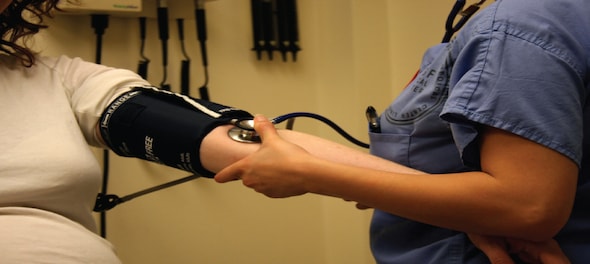
Blood pressure can simply be defined as the pressure exerted by blood on the blood vessels when it moves. High blood pressure or hypertension happens when the blood moves through the arteries at a higher pressure than normal.
Many different factors can cause hypertension and if the blood pressure is too high or stays high for a long time, it can cause serious health issues. Uncontrolled hypertension puts you at a higher risk of stroke, heart disease, heart attack and kidney failure.
High blood pressure can be of two types: Primary hypertension and secondary hypertension.
Primary hypertension, also known as the most common type of hypertension, takes many years to develop and is resulted from lifestyle, environment and how the body changes as per the age.
Secondary hypertension is caused by health problems such as kidney issues, sleep apnea, thyroid, etc.
Symptoms:
The disease is called "a silent killer" as there are no symptoms for high blood pressure. Some may experience headaches, nosebleeds, or shortness of breath. While these may indicate various things, they also occur once the blood pressure has reached a dangerously high level over a period of time.
Causes:
Common factors that may cause high blood pressure are:
Diagnosis:
The initial diagnosis of blood pressure is done by a blood pressure monitor where the doctor or the nurse places a band around your arm that is attached to a small pump and a meter.
The two readings found determines the blood pressure: the top number is the systolic reading (the peak blood pressure when your heart is squeezing blood out), the bottom number is your diastolic reading (the pressure when your heart is filling with blood).
The higher the blood pressure, more often the blood pressure should be checked.
How to avoid high blood pressure:
These steps can be taken to avoid or reduce the risk for high blood pressure:
You can consult with your doctors if the blood pressure tends to remain high as he or she can prescribe a different medicine.
Treatment:
Treatment begins with the changing of lifestyle to help reduce your blood pressure and reduce the risk of heart disease. Doctors also prescribe antihypertensive medicines to keep the blood pressure low.
If the blood pressure can be controlled with medicines then you will have to take the medicine for the rest of your life. Do not stop taking the medicine without talking with the doctor, else you may increase your risk of having a stroke or heart attack.
Living with high blood pressure can some time become difficult. You will always need to monitor your weight, make healthy food choices, exercise, learn to cope with stress, avoid smoking, and limit your alcohol intake.
You will have to make sure you are going for regular blood pressure check-ups. You can buy your own, automated arm blood pressure cuff for use at home. Your doctor may want you to check your blood pressure several times a day. You can also use an ambulatory (wear as you are moving about) blood pressure monitor.
First Published: Aug 18, 2019 4:00 PM IST
Check out our in-depth Market Coverage, Business News & get real-time Stock Market Updates on CNBC-TV18. Also, Watch our channels CNBC-TV18, CNBC Awaaz and CNBC Bajar Live on-the-go!


Prajwal Revanna's father in custody for alleged kidnapping and sexual abuse
May 4, 2024 7:53 PM
Delhi, Indore, Surat and Banswara — why these are the most challenging domains for Congress internally
May 4, 2024 1:53 PM
Congress nominee from Puri Lok Sabha seat withdraws, citing no funds from party
May 4, 2024 12:00 PM
Lok Sabha Polls '24 | Rahul Gandhi in Rae Bareli, why not Amethi
May 4, 2024 9:43 AM

